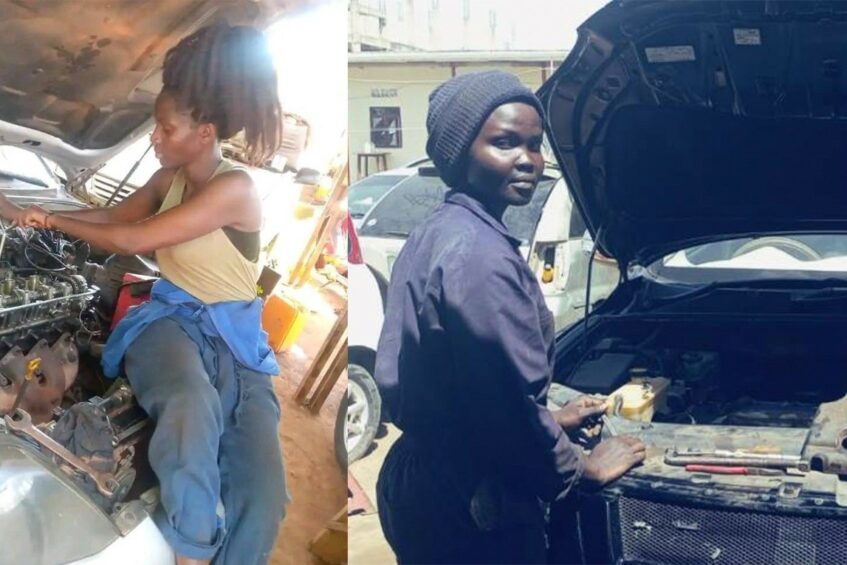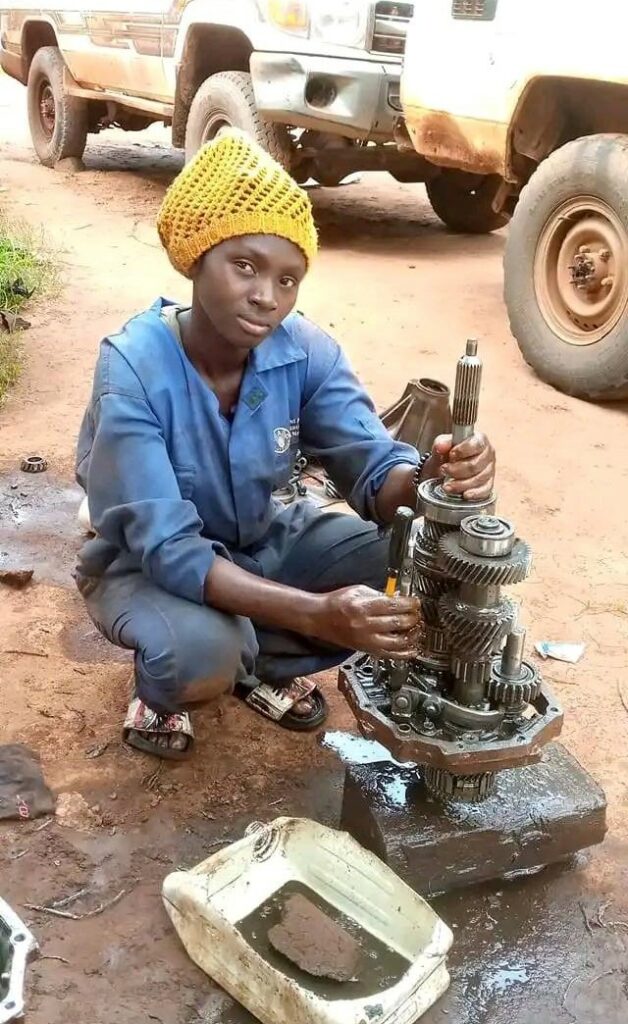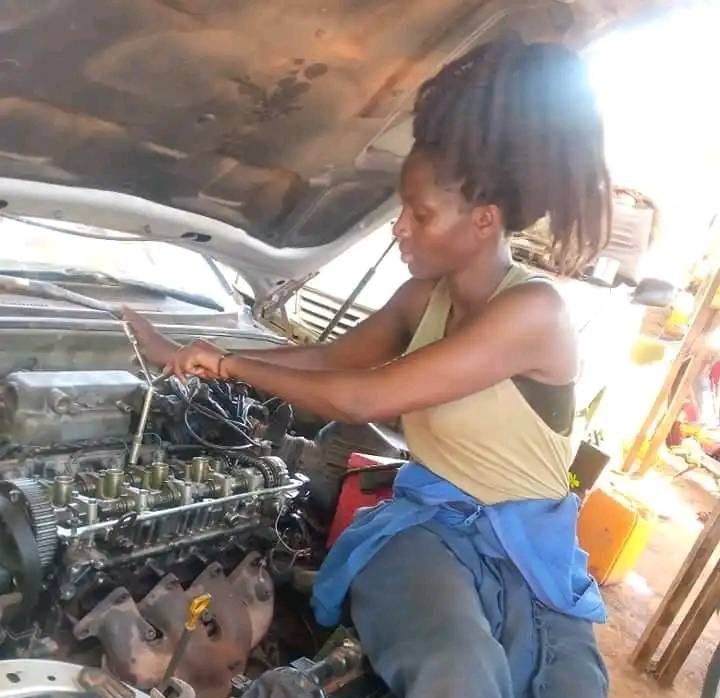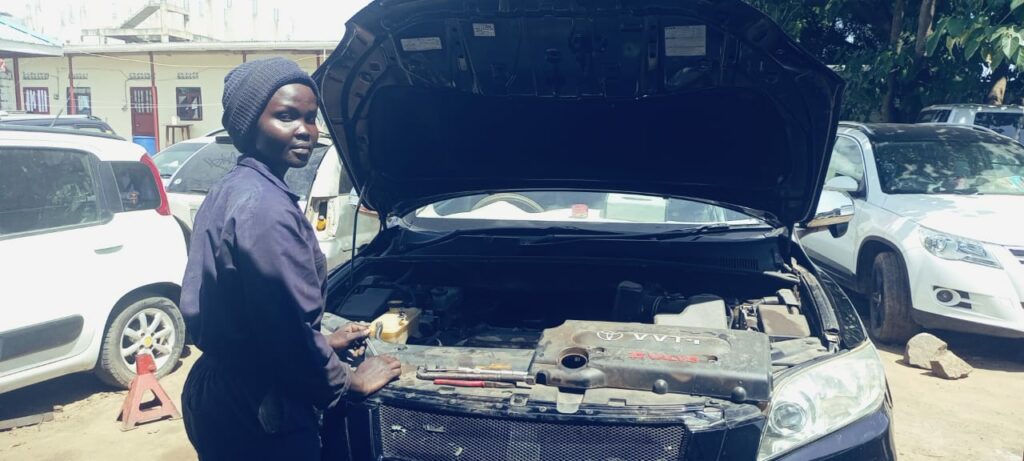
Young mechanics Suwata Sebit Taban (left) and Modo Suzi Methia speaks to Eye Radio about their careers. | Photo grid: Awan Moses/Eye Radio
After Suwata Sebit Taban lost her father in 2015 and her mother in 2021, the 24-year-old had no choice but to become the only breadwinner of six siblings, and ventured into a career she now embraces passionately.
Suwata completed her Certificate of Secondary School Education in 2020 – earning 76.1% in the art section at Bishop Abangite College of Science and Technology in Yambio.
Although she did not attend a mechanical school, Suwata was passionate about the profession and was determined to venture into a career neglected by many young women.
“Most girls are not doing mechanical work here even though there are opportunities for ladies, but they don’t want it. That is why I decided to become a mechanic among the ladies in Western Equatoria,” she told Eye Radio in an interview.
When Suwata approached Nakoda Transport Limited in Yambio for a voluntary job offer, she had no skill in mechanics, but she asked to be given the job saying she is willing and ready to learn.
After a month in practice and keen observation, she is now an Assistant Mechanic at the Nakoda company.

Suwata works daily to disassemble the gearbox unit and separate components for overhauling especially when there is a faulty clutch, or damaged shift linkage which may lead to low transmission of fluid levels.
After disassembling, she works to ensure the gearbox maintains its primary function which includes increasing torque from the driving gear to the driven equipment.
This is to reduce the speed generated by the vehicle or change the direction of the rotating shafts.
Besides this, Suwata said she can also change the engine oil, including hydronic and chrome plating for keeping car parts safe from rust.
She earns a daily wage between 5,000 to 15,000 in average but it depends on the availability of work at the garage.
“I cannot spend a single day without going home with money, but some girls say it is a dirty work and they don’t like it but for me I like it,” she said.

“So, I am dirty, but I know what I am doing, I am dirty, but I am gaining, I am dirty, but I have money.”
Suwata said her job has alienated her from many of her peers who believe in the so-called decent white-collar jobs.
However, she said the work matters a lot, and having five siblings relying on her for school fees and basic needs is an important reason why she does not have to listen to her peers or go the society’s way.
“I have many friends even they don’t want me anymore because of the work I am doing. I don’t have time, from Monday to Saturday. it is only Sunday that I am resting.”
She adds: “This is the work I am doing to pay those younger siblings of mine; I am paying the school fees of five of them.”
Suwata’s dream is to save enough capital to open her own garage and employ more young people in the future.
In an interview with Eye Radio, she appeals to fellow young women in Western Equatoria State and across the country to join her in grabbing any earning profession instead of becoming idle.
“I even want other young women to come and join me so that we can be examples to others.”
Another female mechanic is Modo Suzi Methia, 25, who learned from and inherited the profession from her father.
Modo Suzi Methia, an Assistant Mechanic at Pink Pek International Company in Juba says she embraced the mechanic skills from her father.
“My dad is both a driver and a mechanic.” She said.
“When I was young, I used to see him repairing vehicles, so it motivated me to do that. Then he gives me the courage also to do mechanic,” Modo added.
Hailing from Kangapo II Payam of Kajo-Keji County in Central Equatoria State, Modo graduated at Kobok Technical Instituted in 2021 with Certificate in Engine Repair and Suspension.

According to her, she is perfect in engine repairs and parts of the vehicles.
“I can do perfect on suspension and replacement of the engine,” she proudly stated.
Being the firstborn, Modo now wakes up early in the morning and assists the family in some domestic work before leaving for work at 7 AM.
Speaking to Eye Radio, Modo said the work helps her with the necessary upkeep and to support the family as well.
While stating some of the challenges with mechanical engineering, Modo said she always sees it difficult to lift some vehicle parts.
“Some parts of the vehicle are a bit heavy you cannot manage to lift them alone because we do manual work, we don’t have these machines which lift that is the main challenge that I face as a female mechanic.”
“I call for reinforcement from my guys to help me in case I cannot lift it alone then I call them to support me.”
Modo said she also intends to open her own garage to create more job opportunities for young people in the community.
“I pray harder that by the time God will bless me, when I get my own capital and I have all the skills then I will open for me my small garage to start up my own business.”
Though being supported by her male counterpart, Modo says she expects to join mechanical work to address the gender gaps in the industry.
“We should not put in mind that what men do, women cannot do. So, I am requesting my young ladies out there to do this work. Let them join me so that we should also be many.”
“In this compound, I am working alone, and I want somebody from the same sex that I can share ideas with.”
On July 15, South Sudan will mark the World Youth Skills Day to raise awareness about the importance of technical, vocational education & training and the development of other skills relevant to both local and global economies.
Several studies have found that gender roles in South Sudan are greatly responsible in limiting young women’s lives.
Human Rights Watch says although most South Sudanese young women aspire to have a career, early marriage and domestic duties cut their journey to achieve their dreams short.
Support Eye Radio, the first independent radio broadcaster of news, information & entertainment in South Sudan.
Make a monthly or a one off contribution.
Copyright 2024. All rights reserved. Eye Radio is a product of Eye Media Limited.